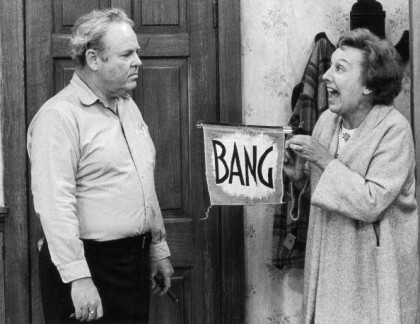Judge Not?
Devra Torres | May 9, 2012 | 8 cmts
Judge not, that you be not judged.... Why do you see the speck that is in your brother's eye, but do not notice the log that is in your own eye?
--Matt. 7:1,3
Don't compare your inside to someone else's outside.
--All over the internet
The first quote needs no introduction. This passage, or at least the "Judge not" part, has got to be every bit as popular with non-Christians as John 3:16 is with Tim Tebow.

The second quote is a piece of pop wisdom I ran into thanks to the always-entertaining Susie Lloyd and liked. (I've gotten far less snobbish in my old age and no longer turn up my nose at wisdom that comes in pop clothing: it's all part of "Diligere veritatem omnem et in omnibus"--love all truth and love it in all things.)
Together, the two quotes draw our attention to the gaping void where our Socratic ignorance is supposed to be. We don't know that we don't know. It somehow escapes our attention that we're walking around with logs in our eyes. And let's not miss what He's implying here: He could have said a twig, or a pebble--but a whole log?

There is just no flattering way to interpret that one.
On the one hand, we're not even familiar with our own insides, but we assume we are; on the other, we may understand each other's outsides, but we mistake them for insides.
We run into problems coming and going: judging others too harshly and ourselves too leniently, but also the other way around.
It's fairly easy to see the sense in refraining from judging a stranger, or a passing acquaintance. Maybe we've never walked in his moccasins. But what if it's someone we know very, very well--someone we've grown up with, been married to for decades, or given birth to? Is it really possible to be so ignorant of the inner reality of another human being in this case?
Well, yes. Definitely. Caryll Houselander, straight-talking 20th-century mystic and poet, has this to say in her Reed of God

It is just as easy to come to know someone less and less through living in the same room as it is to know him more and more. This is because we usually judge people by our own reactions, fears and desires. We do not see them as separate people who possess their own soul and live their own lives, but as part of ourselves and our lives [emphasis added: how's that for hitting the personalist nail on the head?]; we attribute to them motives which we would have in the same circumstances.
When you share a room, it is yet more easy to judge, not only by your own motives, but by your own reactions....
You are tired; you discover that your room-mate is selfish, inconsiderate; she proves it by turning on the radio, banging the door, having a loud voice, and not being tired herself.
She is tired; and you are full of well-being; you are irritated to find how selfish she is: gloomy, depressing, a wet-blanket, painfully wanting in moral stamina.
What might be even less clear is that we don't even grasp what's transpiring in our own insides. God knows us better than we know ourselves, and sometimes that's not saying much. In C. S. Lewis' Screwtape Letters, the senior devil gives his apprentice this advice:

You must bring him to a condition where he can practise self-examination for an hour without discovering any of the facts about himself which are perfectly clear to anyone who has ever lived in the same house with him or worked in the same office.
So should we judge, or not? Can't we call good good, and evil evil? Can we affirm, say, that genocide is wrong? Do we need to walk in a genocidal maniac's moccasins for a day, or be free of all imperfection ourselves, to make a pronouncement like that? Long live the dictatorship of relativism?
No.
We can and must judge actions. We do it all the time. No one could ever grow up, raise a child, run a business, or sustain a political order for five minutes without judging actions. It's the hearts of others we're supposed to leave to Someone Else.
 So, we can breathe a sigh of relief, right? We need only concern ourselves with actions.
So, we can breathe a sigh of relief, right? We need only concern ourselves with actions.
Let's see, then: we'll need to know the external state of affairs, the intrinsic nature of each act, the degree of freedom with which the subject performs it, the degree of knowledge of which he's capable, and any physiological conditions which might interfere with his perception or evaluative powers and exacerbate or mitigate his culpability. We should also be cognizant of any prejudice on our part, any moral obstacle that could be clouding our own perception, any lack of knowledge that might hinder our judgment...
Growing up, raising children, running businesses, and sustaining political orders ought to be a breeze, as long as we keep in mind this simple advice:
Judge not.
Or if you do, be vewy, vewy careful.




Comments (8)
Katie van Schaijik
May 11, 2012 9:26am
One of the many things that stays with me from Dr. Peter's talk (members can listen) on The Art of Loving Your Spouse referred to that "log in your own eye" verse. He said that often in his counselling practice, and in himself, he's come up against the reasoning, "Well, that's true when there is a log in my eye, but what about the cases where I'm definitely innocent and right..."
We all laughed with recognition and chagrin.
He said he has come to the conviction that it's always the case that when we judge another, it's a speck vs. log situation. The reason is that when we judge like that, we are trespassing on another's interior terrain. Our business is our own terrain. That's where we should be focussing our moral attention and energy. When we focus on someone else's inner domicile, we are not only (by the nature of the case) not attending to our own zone of responsibility, but we are messing up someone else's--making it hard for them to do what they are given to do.
I mused on this point in a post a few weeks back.
It's so hard to resist, though, isn't it?
Devra Torres
May 11, 2012 11:16am
I also got good advice about logs and splinters very early on in marriage! There's a misunderstanding I think some people have that, since the two are becoming one, everything about each one becomes the other's business--which can make for all kinds of trouble.
Lisa in NH
May 12, 2012 8:05am
Devra, I am struggling so powerfully with this right now. I am grateful for your words, and also for KvS's post. I believe that only when I can remove myself (logs, splinters and all) from the equation, will I be able to see the truth, and hopefully, obtain some peace. The problem is one that involves my children, therefore, it's so much harder for me to be objective. Gosh, I wish you were here. I'd love to have a long chat.
I am so glad to see you writing! You Prevers are so gifted!
Many blessings -- Lisa Sweet
Devra Torres
May 12, 2012 9:36am
Lisa, thank you! Yes, the older the kids get, the trickier it is to find the line, be objective, attain some kind of peace. I think it's good to remember we can't remove logs or splinters by ourselves anyway, but only by grace, since it's only by grace that we can perceive that there is a log in our eye in the first place.
Something that has been enormously helpful to me in this area is the books of Jacques Philippe, expecially Interior Freedom and Searching For and Maintaining Peace. The latter (which is very short--an easy but very deep read) has a very insightful section on maintaining peace when someone else is the cause of your losing it. He also has a section, I think, about untangling things when it's one of your children, and how to separate out concern for God's will to be done, concern for the child, concern for how it reflects on you, the tendency to project and to react to the state of a child's soul when you're really reacting to seeing the same tendency in yourself from way back, maybe before the child was born...
Devra Torres
May 12, 2012 9:39am
I hope to review both books here--they're very relevant to The Personalist Project. There's also another one, which is not out in English yet, called Love and Self-Esteem, by Michel Esparza, which I want to do a post on.
Lisa, if you want, email me your phone number, and let's talk!
Katie van Schaijik
May 12, 2012 9:44am
Yes, do Devra! I purchased Interior Freedom a few years ago and was so impressed with the beginning that I gave it to a friend who seemed to need it more than I did. You remind me to look for it again.
Devra Torres
May 12, 2012 9:59am
I know! I had three copies of the one about peace but gave them all away! I knew one priest who bought a copy for each of his parishioners!
Fr. Jacques' specialty specialty seems to be presenting classic Catholic teaching in a way that people today can hear, and also dissolving misunderstandings that can wreak havoc in people's interior lives. It centers on what it means to be a person, to flourish as a person, and how it's God's will for us to wholeheartedly use our freedom and not be anxiety-riddden about circumstances, or even our own sins.
Lisa in NH
May 14, 2012 9:28am
Thank you, Devra. I will look up these two books. They sound so helpful. And I would love to chat! You'll hear from me soon. Blessings!